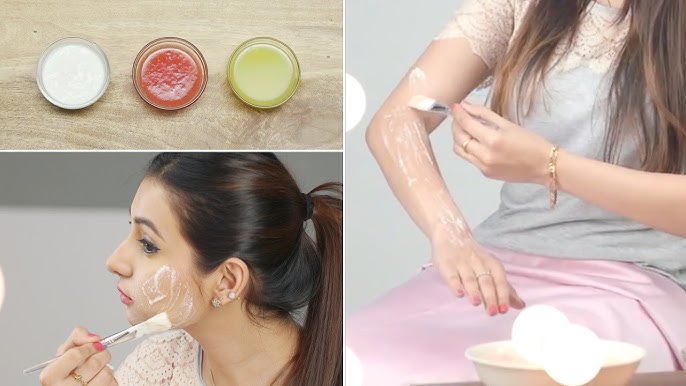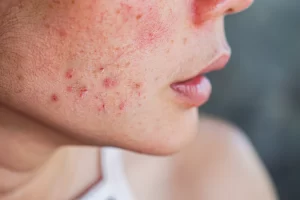Fading Dark Spots: Your Guide To Achieving An Even Skin Tone

Fading Dark Spots: Your Guide To Achieving An Even Skin Tone
How to get rid of dark spots and uneven skin tone naturally?
While it takes time and consistency, you can work towards reducing dark spots and achieving a more even skin tone naturally. Here’s a breakdown of effective approaches:
1. Gentle Exfoliation:
- Natural Exfoliants: Ingredients like lactic acid in yogurt, and enzymes in papaya can gently remove dead skin cells, revealing brighter skin underneath. Use a plain yogurt mask or mashed papaya a few times a week.
- Gentle Scrubs: Finely ground oats or almond meal mixed with honey or yogurt can provide mild physical exfoliation. Be very gentle to avoid irritation.
2. Brightening Natural Ingredients:
- Vitamin C Rich Sources: Lemon juice, orange juice, and strawberries contain vitamin C, a potent antioxidant and natural brightening agent. Apply diluted fresh juice (always do a patch test first and avoid sun exposure immediately after) or use mashed strawberries as a mask.
- Aloe Vera: Contains aloin, a compound that may help lighten hyperpigmentation. Apply fresh aloe vera gel directly to dark spots.
- Honey: A natural humectant with mild bleaching and moisturizing properties. Apply raw honey as a mask.
- Turmeric: Contains curcumin, which may help reduce melanin production and has anti-inflammatory benefits. Mix turmeric powder with honey or yogurt for a mask.
- Licorice Root Extract: Contains glabridin, which can inhibit melanin production. Look for natural skincare products containing this extract.
- Green Tea: Rich in antioxidants that can help protect skin and may have skin-lightening effects. Apply cooled brewed green tea to the skin.
- Potato: Contains an enzyme called catecholase, which may help lighten dark spots. Rub a slice of raw potato on the affected areas.
- Apple Cider Vinegar: Contains acetic acid, which may act as a natural exfoliant. Dilute it significantly with water (1 part ACV to 1 part water or more) and apply sparingly to dark spots, leaving it on for a short time before rinsing. Use with caution as it can be irritating.
3. Consistent Skincare Routine:
- Gentle Cleansing: Use a mild, natural cleanser to avoid stripping your skin’s natural oils.
- Hydration: Moisturize daily with a natural, non-comedogenic moisturizer to support skin health and repair. Ingredients like aloe vera, honey, and natural oils (jojoba, almond) can be beneficial.
4. Sun Protection is Non-Negotiable:
- Broad-Spectrum Sunscreen: This is the most crucial step in preventing and reducing hyperpigmentation. Apply a broad-spectrum sunscreen with an SPF of 30 or higher every day, even on cloudy days.
- Protective Clothing: Wear hats and sunglasses to shield your skin from direct sunlight.
- Seek Shade: Limit sun exposure, especially during peak hours (10 AM to 4 PM).
5. Healthy Lifestyle:
- Hydration: Drink plenty of water to keep your skin hydrated from within.
- Balanced Diet: Consume fruits and vegetables rich in antioxidants and vitamins.
- Adequate Sleep: Allows your skin to repair and regenerate.
- Manage Stress: Stress can exacerbate skin problems. Practice stress-reducing techniques.
Important Considerations:
- Patch Test: Always perform a patch test on a small area of your skin before applying any new natural remedy to your entire face, as some ingredients can cause irritation or allergic reactions.
- Consistency is Key: Natural remedies often work gradually. Be patient and consistent with your chosen routine.
- Listen to Your Skin: If you experience any redness, irritation, or discomfort, discontinue use.
- Not a Replacement for Medical Advice: If your hyperpigmentation is severe or persistent, consult a dermatologist. They can provide a proper diagnosis and recommend the most effective treatment plan for your specific needs.
While natural methods can be helpful, they may not provide the rapid results of professional treatments. However, with consistent effort and the right natural ingredients, you can often see a visible improvement in dark spots and uneven skin tone over time.
What can I use for dark spots and uneven skin tone?
There are various approaches you can take to address dark spots and uneven skin tone, ranging from over-the-counter (OTC) products to professional treatments and natural remedies. The best approach for you will depend on the severity of your concerns, your skin type, budget, and how quickly you want to see results.
Over-the-Counter (OTC) Products:
Look for products containing the following active ingredients, which can help to lighten dark spots and even out skin tone over time:
- Vitamin C (L-Ascorbic Acid): A potent antioxidant that can brighten skin, inhibit melanin production, and protect against free radical damage.
- Niacinamide (Vitamin B3): Helps to reduce hyperpigmentation by inhibiting the transfer of melanin to skin cells, improves skin barrier function, and reduces inflammation.
- Alpha Hydroxy Acids (AHAs) like Glycolic and Lactic Acid: These exfoliate the top layer of dead skin cells, revealing brighter skin and promoting cell turnover.
- Retinoids (Retinol, Retinaldehyde): Promote cell turnover, help to fade dark spots, and improve skin texture. Start with a low concentration and gradually increase as tolerated. Note that retinoids can make your skin more sun-sensitive.
- Kojic Acid: Inhibits tyrosinase, an enzyme involved in melanin production.
- Azelaic Acid: Has anti-inflammatory and antioxidant properties and can help with hyperpigmentation and redness.
- Alpha Arbutin: A derivative of hydroquinone that is considered a gentler brightening agent.
- Licorice Root Extract: Contains glabridin, which can inhibit melanin production and has anti-inflammatory effects.
Important Considerations for OTC Products:
- Sunscreen is Crucial: Regardless of the products you use, daily broad-spectrum sunscreen with an SPF of 30 or higher is essential to prevent further darkening of spots and protect your skin.
- Patch Test: Always test new products on a small area of skin before applying them to your entire face to check for any irritation.
- Consistency: It takes time and consistent use to see results from OTC products, typically several weeks to months.
- Gentle Products: Opt for gentle, fragrance-free products to minimize the risk of irritation, which can worsen hyperpigmentation.
Professional Treatments:
For faster and more significant results, consider consulting a dermatologist about these professional treatments:
- Chemical Peels: Stronger concentrations of acids exfoliate the skin’s surface, removing pigmented cells. Different types and depths of peels are available.
- Laser Treatments (e.g., Q-switched lasers, fractional lasers, IPL): Target and break down melanin in the skin. The type of laser used will depend on the type and depth of hyperpigmentation.
- Microdermabrasion and Dermabrasion: Physically exfoliate the top layers of skin to improve tone and texture. Dermabrasion is more aggressive and goes deeper.
- Microneedling: Creates tiny punctures in the skin, which can stimulate collagen production and improve the absorption of topical treatments. It can also help with some types of hyperpigmentation.
- Prescription Topical Medications: Dermatologists can prescribe stronger formulations of ingredients like hydroquinone or retinoids.
Important Considerations for Professional Treatments:
- Consultation is Key: A dermatologist can diagnose the cause of your dark spots and uneven skin tone and recommend the most appropriate and safe treatment plan for your skin type and condition.
- Potential Side Effects: Be aware of potential side effects, such as redness, peeling, and temporary darkening of the skin.
- Cost: Professional treatments can be more expensive than OTC products.
- Sun Protection: Strict sun protection is crucial before and after any professional treatment.
Natural Remedies:
As mentioned in the previous response, some natural ingredients may help to improve dark spots and uneven skin tone over time. However, their effectiveness is generally less potent and slower compared to targeted active ingredients and professional treatments.
In summary, the best approach often involves a combination of:
- Consistent use of a broad-spectrum sunscreen daily.
- Incorporating OTC products with evidence-based brightening ingredients into your skincare routine.
- Considering professional treatments under the guidance of a dermatologist for faster or more stubborn hyperpigmentation.
- Maintaining a healthy lifestyle.
It’s always best to consult with a dermatologist to get a personalized recommendation for addressing your specific concerns.


